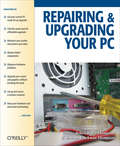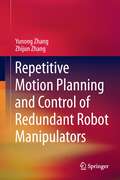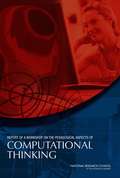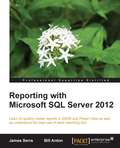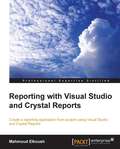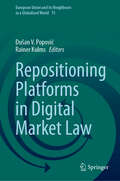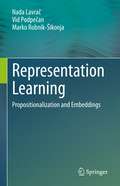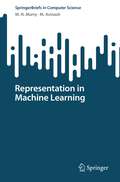- Table View
- List View
Renewable Energy for Smart and Sustainable Cities: Artificial Intelligence in Renewable Energetic Systems (Lecture Notes in Networks and Systems #62)
by Mustapha HattiThis book features cutting-edge research presented at the second international conference on Artificial Intelligence in Renewable Energetic Systems, IC-AIRES2018, held on 24–26 November 2018, at the High School of Commerce, ESC-Koléa in Tipaza, Algeria. Today, the fundamental challenge of integrating renewable energies into the design of smart cities is more relevant than ever. While based on the advent of big data and the use of information and communication technologies, smart cities must now respond to cross-cutting issues involving urban development, energy and environmental constraints; further, these cities must also explore how they can integrate more sustainable energies. Sustainable energies are a major determinant of smart cities’ longevity. From an environmental and technological standpoint, these energies offer an optimal power supply to the electric network while creating significantly less pollution. This requires flexibility, i.e., the availability of supply and demand. The end goal of any smart city is to improve the quality of life for all citizens (both in the city and in the countryside) in a way that is sustainable and respectful of the environment. This book encourages the reader to engage in the preservation of our environment, every moment, every day, so as to help build a clean and healthy future, and to think of the future generations who will one day inherit our planet. Further, it equips those whose work involves energy systems and those engaged in modelling artificial intelligence to combine their expertise for the benefit of the scientific community and humanity as a whole.
Renewing U.s. Telecommunications Research
by National Research Council of the National AcademiesThe modern telecommunications infrastructure—made possible by research performed over the last several decades—is an essential element of the U.S. economy. The U.S. position as a leader in telecommunications technology, however, is at risk because of the recent decline in domestic support of long-term, fundamental telecommunications research. To help understand this challenge, the National Science Foundation asked the NRC to assess the state of telecommunications research in the United States and recommend ways to halt the research decline. This report provides an examination of telecommunications research support levels, focus, and time horizon in industry, an assessment of university telecommunications research, and the implications of these findings on the health of the sector. Finally, it presents recommendations for enhancing U.S. telecommunications’ research efforts.
Repairing Play: A Black Phenomenology (Playful Thinking)
by Aaron TrammellA provocative study that reconsiders our notion of play—and how its deceptively wholesome image has harmed and erased people of color.Contemporary theorists present play as something wholly constructive and positive. But this broken definition is drawn from a White European philosophical tradition that ignores the fact that play can, and often does, hurt. In fact, this narrow understanding of play has been complicit in the systemic erasure of Black, Indigenous, and People of Color (BIPOC) from the domain of leisure. In this book, Aaron Trammell proposes a corrective: a radical reconsideration of play that expands its definition to include BIPOC suffering, subjugation, and taboo topics such as torture. As he challenges and decolonizes White European thought, Trammell maps possible ways to reconcile existing theories with the fact that play is often hurtful and toxic.Trammell upends current notions by exploring play&’s function as a tool in the subjugation of BIPOC. As he shows, the phenomenology of play is a power relationship. Even in innocent play, human beings subtly discipline each other to remain within unspoken rules. Going further, Trammell departs from mainstream theory to insist that torture can be play. Approaching it as such reveals play&’s role in subjugating people in general and renders visible the long-ignored experiences of BIPOC. Such an inclusive definition of play becomes a form of intellectual reparation, correcting the notion that play must give pleasure while also recasting play in a form that focuses on the deep, painful, and sometimes traumatic depths of living.
Repairing and Upgrading Your PC
by Robert Bruce Thompson Barbara Fritchman ThompsonMost computer users think that fiddling with the insides of their PC is taboo. They fear that by removing the screws that hold the case on, they're crossing into forbidden territory. And even for those who know they can open the box and fix or upgrade their PC, analysis paralysis often stops them in their tracks: Which upgrades offer the best bang for the buck? How do you pinpoint the faulty component that's making your system freeze? What about compatibility issues?Get ready to get unstuck and get your PC running fast and running right. Repairing and Upgrading Your PC delivers start-to-finish instructions, simple enough for even the most inexperienced PC owner, for troubleshooting, repairing, and upgrading your computer. Written by hardware experts Robert Bruce Thompson and Barbara Fritchman Thompson, this book covers it all: how to troubleshoot a troublesome PC, how to identify which components make sense for an upgrade, and how to tear it all down and put it back together. This book shows how to repair and upgrade all of your PC's essential components:Motherboard, CPU, and Memory. Choose the optimal match of these core components to keep your PC running at top speedHard Drive, Optical Drive, and Removable StorageGive your computer what it needs for long-term and short-term storageAudio and Video. Enhance your computing experience with the right sound and graphics devices for your needsInput Devices. Pick the best keyboard and mouse to keep your hands happy and healthyNetworking. Set up secure wireless networking to keep the bits flowing between your computers and the outside worldCases and Power Supplies. Keep everything running cool and reliablyWith its straightforward language, clear instructions, and extensive illustrations, this book makes it a breeze for PC owners of any skill level to work on their computer.
Repatriation Management and Competency Transfer in a Culturally Dynamic World
by Firdous Ahmad Malik Manmeet Bali NagThis book examines the relevance of global strategic perspective, as international competition continues to intensify & gain momentum, and management of human resource remains a challenge in contemporary corporate scenario. As global business strategy requires globally competent people and implementation of global human resource systems, therefore the need to harness the multi-faceted dimensions of corporate employees is elaborated upon. This book explores cross cultural movement & interactions in International human resource management, where the theme of cross-cultural reentry remains largely neglected and underestimated in the sojourner’s transition trajectory. This book takes into account the available empirical investigations pointing to substantial concerns, affecting the psychological wellbeing, social readjustment and cultural identity of the returning individuals. This book examines the significance of re-entry as an issue of highest priority to both sojourning individuals as well as people managing the reentry transitions of travelers. In light of the unfolding knowledge revolution, the book explores the context of corporate India offering high knowledge density and rich demographic dividend. The need for companies, to harness the knowledge capital and accelerate Indians in the knowledge revolution is examined. Various factors that can influence the repatriation of an individual when back in the home country, and the challenges faced in repatriation at the individual-, team-, organizational-, and country-levels, is explored & analyzed. This book focuses on eliminating overall wastage and losses in Repatriation process, from an organizational point of view.The purview of this book encompasses the interface of Anticipatory Adjustment, Competency Transfer, Effective Repatriation and Reverse Culture Shock with Repatriates’ Adjustment, back home, and empirically analyzes the precursors and effects of the said paradigms in optimization of Repatriate talent from an organizational perspective. The purpose is to analyze the antecedents of repatriate adjustment in the mentioned context and to subsequently deliberate upon the acquired results to arrive at feasible and relevant conclusions. Optimization of Repatriate talent, and Repatriation Management from International Human Resource Management (IHRM) perspective, deserves a cross-disciplinary study of precursors effecting Repatriation Adjustment, with focus on the dimension of Indian Repatriate acculturation.
Repetitive Motion Planning and Control of Redundant Robot Manipulators
by Zhijun Zhang Yunong ZhangRepetitive Motion Planning and Control of Redundant Robot Manipulators presents four typical motion planning schemes based on optimization techniques, including the fundamental RMP scheme and its extensions. These schemes are unified as quadratic programs (QPs), which are solved by neural networks or numerical algorithms. The RMP schemes are demonstrated effectively by the simulation results based on various robotic models; the experiments applying the fundamental RMP scheme to a physical robot manipulator are also presented. As the schemes and the corresponding solvers presented in the book have solved the non-repetitive motion problems existing in redundant robot manipulators, it is of particular use in applying theoretical research based on the quadratic program for redundant robot manipulators in industrial situations. This book will be a valuable reference work for engineers, researchers, advanced undergraduate and graduate students in robotics fields. Yunong Zhang is a professor at The School of Information Science and Technology, Sun Yat-sen University, Guangzhou, China; Zhijun Zhang is a research fellow working at the same institute.
Replayed: Essential Writings on Software Preservation and Game Histories
by Henry LowoodA leading voice in technology studies shares a collection of essential essays on the preservation of software and history of games.Since the early 2000s, Henry E. Lowood has led or had a key role in numerous initiatives devoted to the preservation and documentation of virtual worlds, digital games, and interactive simulations, establishing himself as a major scholar in the field of game studies. His voluminous writings have tackled subject matter spanning the history of game design and development, military simulation, table-top games, machinima, e-sports, wargaming, and historical software archives and collection development. Replayed consolidates Lowood's far-flung and significant publications on these subjects into a single volume. Lowood offers important historical contexts for digital and analog game objects and their implications for both documentation and preservation. Replayed is divided into three sections focused on archives, documentation, and the preservation of historical software, game histories and historiography, and future directions. The volume includes two previously unpublished essays, along with Lowood's reflective section introductions that provide a contemporary take on his previously published works. Rounding out the book are a foreword by Matthew G. Kirschenbaum detailing Lowood's sustained commitment to games, an introduction by editor Raiford Guins sharing Lowood's scholarly and curatorial pursuits, and an extensive interview with Lowood on his personal and professional background conducted by T. L. Taylor. For those interested in the history of technology, game studies, libraries, archives, and museums, Replayed presents the opportunity to read Lowood's works—writing that remains timely, skillfully executed, and rigorously researched—as a major project chronicling the history of games and forecasting the opportunities and challenges faced by future game historians.
Report of a Workshop of Pedagogical Aspects of Computational Thinking
by The National Academy of SciencesIn 2008, the Computer and Information Science and Engineering Directorate of the National Science Foundation asked the National Research Council (NRC) to conduct two workshops to explore the nature of computational thinking and its cognitive and educational implications. The first workshop focused on the scope and nature of computational thinking and on articulating what "computational thinking for everyone" might mean. A report of that workshop was released in January 2010. Drawing in part on the proceedings of that workshop, Report of a Workshop of Pedagogical Aspects of Computational Thinking, summarizes the second workshop, which was held February 4-5, 2010, in Washington, D. C. , and focuses on pedagogical considerations for computational thinking. This workshop was structured to gather pedagogical inputs and insights from educators who have addressed computational thinking in their work with K-12 teachers and students. It illuminates different approaches to computational thinking and explores lessons learned and best practices. Individuals with a broad range of perspectives contributed to this report. Since the workshop was not intended to result in a consensus regarding the scope and nature of computational thinking, Report of a Workshop of Pedagogical Aspects of Computational Thinking does not contain findings or recommendations.
Report on China Smart Education 2022: Digital Transformation of Chinese Education Towards Smart Education (SpringerBriefs in Education)
by China National Academy of Edu., SciencesThis book aims to reflect the digital transformation of Chinese education toward smart education comprehensively and accurately. It is the first systematic summary of the progress of smart education in China. The book believes that smart education is a new education form in the digital era and is essentially distinct from education forms in the industrial era. This new education form is innovative in five dimensions. First is the new core concept. Smart education is not only a concrete action concerning people’s well-being, but also a vital strategy concerning national plans. Through technology empowerment and data drive, it empowers educational reform in all aspects, systematically constructs a new relationship between education and society, provides suitable education for each learner, and makes the aptitude-based teaching that we have been dreaming of for thousands of years a reality. For the first time in history, smart education helps to reach the full alignment between individual development and societal development. Second is the new system structure. Smart education will break through the boundaries of school education, drive the diversified combination of various education types, resources, and elements, promote the collaboration of school, family, and society in education, and build a high-quality, individualized lifelong learning system that is available for anyone anywhere anytime. Third is the new teaching paradigm. Smart education will integrate physical, social, and digital spaces to create new learning scenarios and promote human–technology integration, and cultivate cross-grade, cross-class, and cross-discipline learning communities across time and space to organically combine large-scale education with individualized cultivation. Fourth is the new educational content. Smart education will focus on developing all-round education, establishing digital knowledge graphs based on systematic logics of knowledge points, and innovating content presentation methods to make learning a wonderful experience and help learners develop higher-order thinking skills, comprehensive innovation capability, and lifelong learning ability. Fifth is the new education governance. With data governance at the core and digital intelligence technology as the driver, smart education will boost the holistic reengineering of education administration and business processes and enhance the modernization of the education governance system and governance capacity. This book is intended for teachers, education administrators, education policymakers, education researchers, and parents concerned about education innovation and development, as well as people from all walks of life who have aspirations for the education industry. It can also serve as a reference for international organizations and education research institutions of all countries to promote the joint exploration of the development path of smart education and create a better future for the world’s mutual development through educational reform.
Report on China Smart Education 2023: Towards a Higher Level of Digital Education (Research in Chinese Education)
by China National Academy of Educational SciencesThis book provides a comprehensive overview of the development of smart education in China. It defines smart education as a higher level of digital education that can be divided into four stages, including resource sharing, data-driven, integration with AI, and ecology reshaping. It proposes five practical paths for the development of smart education in China, such as cultivating innovation literacy as its goal and data empowerment as its core, and it develops an evaluation framework consisting of four dimensions, including extensive connectivity, innovative application, mechanism guarantee, and literacy improvement. Finally, it also identifies five trends in the global development of digital education. This book serves as a valuable resource for teachers, education administrators, education researchers, and other readers who are interested in educational innovation and development in China.
Reporting in TFS
by Dipti ChhatrapatiThis book is intended for developers, testers, architects, and project managers who want to explore and make use of the reporting facilities of Team Foundation Server 2013. Although no previous experience of reporting is required, a basic understanding of the Team Foundation Components and project templates would be a plus.
Reporting with Microsoft SQL Server 2012
by Bill Anton James SerraThis is a step-by-step tutorial that deals with Microsoft Server 2012 reporting tools:SSRS and Power View. If you are a BI developer, consultant, or architect who wishes to learn how to use SSRS and Power View, and want to understand the best use for each tool, then this book will get you up and running quickly. No prior experience is required with either tool!
Reporting with Visual Studio and Crystal Reports
by Mahmoud ElkoushA fast-paced, example-based guide to learn how to create a reporting application using Visual Studio and Crystal Reports."Reporting with Visual Studio and Crystal Reports" is for developers new to Crystal Reports. It will also prove useful to intermediate users who wish to explore some new techniques in Crystal Reports using Microsoft Visual Studio. Readers are expected to have basic knowledge of C#, Microsoft Visual Studio, and Structured Query Language (SQL).
Repositioning Platforms in Digital Market Law (European Union and its Neighbours in a Globalized World #15)
by Dušan V. Popović Rainer KulmsOnline platforms and their ecosystems are the cornerstone of the digital economy. They have brought forth positive network effects. But they are also known for their information asymmetries, their potential for market failures and their problematic relationship with data protection law. This volume provides a detailed analysis of the current process of repositioning online platforms in the digital economy as regulators express concerns about the evolution from mere intermediaries to gatekeepers. The exclusive reliance on competition law instruments has proven to be incapable of coping with cases of platforms abusing their market power. Therefore, the book explores the European Union's new approach to digital markets consisting in the adoption or drafting of new legislative instruments, such as the Digital Markets Act, Digital Services Act, Proposal of AI Act, Proposal of Data Act, Proposal of Data Governance Act. The EU's emphasis on new regulatory ex ante instruments (as in the Digital Markets Act) calls for an assessment of their overlap or their interface with existing supranational and national competition rules. The book transcends mere competition law thinking by exploring the status of online platforms from the perspective of trade law rules, unfair competition law, data protection rules and intellectual property law. But in view of the global reach of online platforms, the risks of a jurisdiction-wise approach with conflicting regulatory strategies are all too clear. The volume therefore includes comparative studies on Australia and the USA. The potential impact of regulatory policy choices will also be assessed from the economic perspective. The book's message is not be confined to researchers and academics. It is also of great importance to practitioners in the digital sector who stand to benefit from the analysis of the law of online platforms, undertaken by a working group of renowned authors coming from different jurisdictions.
Representation Learning for Natural Language Processing
by Maosong Sun Zhiyuan Liu Yankai LinThis open access book provides an overview of the recent advances in representation learning theory, algorithms and applications for natural language processing (NLP). It is divided into three parts. Part I presents the representation learning techniques for multiple language entries, including words, phrases, sentences and documents. Part II then introduces the representation techniques for those objects that are closely related to NLP, including entity-based world knowledge, sememe-based linguistic knowledge, networks, and cross-modal entries. Lastly, Part III provides open resource tools for representation learning techniques, and discusses the remaining challenges and future research directions. The theories and algorithms of representation learning presented can also benefit other related domains such as machine learning, social network analysis, semantic Web, information retrieval, data mining and computational biology. This book is intended for advanced undergraduate and graduate students, post-doctoral fellows, researchers, lecturers, and industrial engineers, as well as anyone interested in representation learning and natural language processing.
Representation Learning for Natural Language Processing
by Maosong Sun Zhiyuan Liu Yankai LinThis book provides an overview of the recent advances in representation learning theory, algorithms, and applications for natural language processing (NLP), ranging from word embeddings to pre-trained language models. It is divided into four parts. Part I presents the representation learning techniques for multiple language entries, including words, sentences and documents, as well as pre-training techniques. Part II then introduces the related representation techniques to NLP, including graphs, cross-modal entries, and robustness. Part III then introduces the representation techniques for the knowledge that are closely related to NLP, including entity-based world knowledge, sememe-based linguistic knowledge, legal domain knowledge and biomedical domain knowledge. Lastly, Part IV discusses the remaining challenges and future research directions.The theories and algorithms of representation learning presented can also benefit other related domains such as machine learning, social network analysis, semantic Web, information retrieval, data mining and computational biology. This book is intended for advanced undergraduate and graduate students, post-doctoral fellows, researchers, lecturers, and industrial engineers, as well as anyone interested in representation learning and natural language processing.As compared to the first edition, the second edition (1) provides a more detailed introduction to representation learning in Chapter 1; (2) adds four new chapters to introduce pre-trained language models, robust representation learning, legal knowledge representation learning and biomedical knowledge representation learning; (3) updates recent advances in representation learning in all chapters; and (4) corrects some errors in the first edition. The new contents will be approximately 50%+ compared to the first edition. This is an open access book.
Representation Learning: Propositionalization and Embeddings
by Nada Lavrač Vid Podpečan Marko Robnik-ŠikonjaThis monograph addresses advances in representation learning, a cutting-edge research area of machine learning. Representation learning refers to modern data transformation techniques that convert data of different modalities and complexity, including texts, graphs, and relations, into compact tabular representations, which effectively capture their semantic properties and relations. The monograph focuses on (i) propositionalization approaches, established in relational learning and inductive logic programming, and (ii) embedding approaches, which have gained popularity with recent advances in deep learning. The authors establish a unifying perspective on representation learning techniques developed in these various areas of modern data science, enabling the reader to understand the common underlying principles and to gain insight using selected examples and sample Python code. The monograph should be of interest to a wide audience, ranging from data scientists, machine learning researchers and students to developers, software engineers and industrial researchers interested in hands-on AI solutions.
Representation and Management of Narrative Information
by Gian Piero ZarriA big amount of important, 'economically relevant' information, is buried within the huge mass of multimedia documents that correspond to some form of 'narrative' description. Due to the ubiquity of these 'narrative' resources, being able to represent in a general, accurate, and effective way their semantic content - i.e., their key 'meaning' - is then both conceptually relevant and economically important. In this book, we present the main properties of NKRL ('Narrative Knowledge Representation Language'), a language expressly designed for representing, in a standardised way, the 'meaning' of complex multimedia narrative documents. NKRL is a fully implemented language/environment. The software exists in two versions, an ORACLE-supported version and a file-oriented one. Written from a multidisciplinary perspective, this exhaustive description of NKRL and of the associated knowledge representation principles will be an invaluable source of reference for practitioners, researchers, and graduates.
Representation and Reality in Humans, Other Living Organisms and Intelligent Machines (Studies in Applied Philosophy, Epistemology and Rational Ethics #28)
by Gordana Dodig-Crnkovic Raffaela GiovagnoliThis book enriches our views on representation and deepens our understanding of its different aspects. It arises out of several years of dialog between the editors and the authors, an interdisciplinary team of highly experienced researchers, and it reflects the best contemporary view of representation and reality in humans, other living beings, and intelligent machines. Structured into parts on the cognitive, computational, natural sciences, philosophical, logical, and machine perspectives, a theme of the field and the book is building and presenting networks, and the editors hope that the contributed chapters will spur understanding and collaboration between researchers in domains such as computer science, philosophy, logic, systems theory, engineering, psychology, sociology, anthropology, neuroscience, linguistics, and synthetic biology.
Representation in Machine Learning (SpringerBriefs in Computer Science)
by M. N. Murty M. AvinashThis book provides a concise but comprehensive guide to representation, which forms the core of Machine Learning (ML). State-of-the-art practical applications involve a number of challenges for the analysis of high-dimensional data. Unfortunately, many popular ML algorithms fail to perform, in both theory and practice, when they are confronted with the huge size of the underlying data. Solutions to this problem are aptly covered in the book. In addition, the book covers a wide range of representation techniques that are important for academics and ML practitioners alike, such as Locality Sensitive Hashing (LSH), Distance Metrics and Fractional Norms, Principal Components (PCs), Random Projections and Autoencoders. Several experimental results are provided in the book to demonstrate the discussed techniques’ effectiveness.
Representation of Disability in Children’s Video Games (Routledge Research in Disability and Media Studies)
by Krystina MadejRepresentation of Disability in Children’s Video Games looks at how children’s engagement with characters and stories in video games helps create the perception of disability they have as teens and adults. Drawing on child development theory supported by neuroscience, the book shows how the scaffold of information, the schema, adults have of disability is first created at a very young age as they interact through game play with characters with disabilities. Positing that early video game play experiences should provide exposure to narrative schemas that add understanding and help create meaning about the disability represented, the book presents how such representation in children’s video games maps against cognitive development, and the psychomotor and cognitive needs and abilities of children ages 3 to 12. Close reading of over 40 PEGI 3 and PEGI 7 (ESRB E, 10+) games and analysis of games as diverse as Backyard Baseball and Sly Cooper helped define broad categories of representation: representation can be cosmetic, providing exposure but not gameplay utility; it can be incidental, used as a device that provides purpose for the narrative; or it can more authentically represent the disability as integral to the character and their life. The book provides readers with an overview of contemporary games that betters their understanding of how children’s games present disability and how children create their perceptions through interaction with characters and stories. This book will be of interest to academics and students of game studies, in particular topics such as behavioural science, ethics, and HCI, as well as sociology, communications, and digital media.
Representations of Poverty in Videogames
by Adam CrowleyThis book argues that videogames address contemporary, middle-class anxieties about poverty in the United States. The early chapters consider gaming as a modern form of slumming and explore the ways in which titles like The Elder Scrolls V: Skyrim and World of Warcraft thematize poverty. The argument turns to the field of literary studies to identify analytical frameworks for addressing and understanding these themes. Throughout, the book considers how the academic area of inquiry known as game studies has developed over time, and makes use of such scholarship to present, frame, and value its major claims and findings. In its conclusion, the book models how poverty themes might be identified and associated for the purpose of gaining greater insights into how games can shape, and also be shaped by, the player’s economic expectations.
Representations, Analysis and Recognition of Shape and Motion from Imaging Data
by Boulbaba Ben Amor Faten Chaieb Faouzi GhorbelThis book constitutes the refereed proceedings of the 6th International Workshop on Representations, Analysis and Recognition of Shape and Motion from Imaging Data, RFMI 2016, held in Sidi Bou Said Village, Tunisia, in October 2016. The 9 revised full papers and 7 revised short papers presented were carefully reviewed and selected from 23 submissions. The papers are organized in topical sections on 3D Shape Registration and Comparison; Face Analysis and Recognition; Video and Motion Analysis; 2D Shape Analysis.
Representations, Analysis and Recognition of Shape and Motion from Imaging Data: 7th International Workshop, RFMI 2017, Savoie, France, December 17–20, 2017, Revised Selected Papers (Communications in Computer and Information Science #842)
by Liming Chen Boulbaba Ben Amor Faouzi GhorbelThis book constitutes the refereed proceedings of the 7th International Workshop on Representations, Analysis and Recognition of Shape and Motion from Imaging Data, RFMI 2017, held in Savoi, France, in December 2017.The 8 revised full papers and 9 revised short papers presented were carefully reviewed and selected from 23 submissions. The papers are organized in topical sections on analyzing motion data; deep learning on image and shape data; 2D and 3D pattern classification; watermarking, segmentation and deformations.
Representing Conflicts in Games: Antagonism, Rivalry, and Competition (Routledge Advances in Game Studies)
by Jonas Linderoth Anders Frank Björn SjöblomThis book offers an overview of how conflicts are represented and enacted in games, in a variety of genres and game systems. Games are a cultural form apt at representing real world conflicts, and this edited volume highlights the intrinsic connection between games and conflict through a set of theoretical and empirical studies. It interrogates the nature and use of conflicts as a fundamental aspect of game design, and how a wide variety of conflicts can be represented in digital and analogue games. The book asks what we can learn from conflicts in games, how our understanding of conflicts change when we turn them into playful objects, and what types of conflicts are still not represented in games. It queries the way games make us think about armed conflict, and how games can help us understand such conflicts in new ways. Offering a deeper understanding of how games can serve political, pedagogical, or persuasive purposes, this volume will interest scholars and students working in fields such as game studies, media studies, and war studies.



